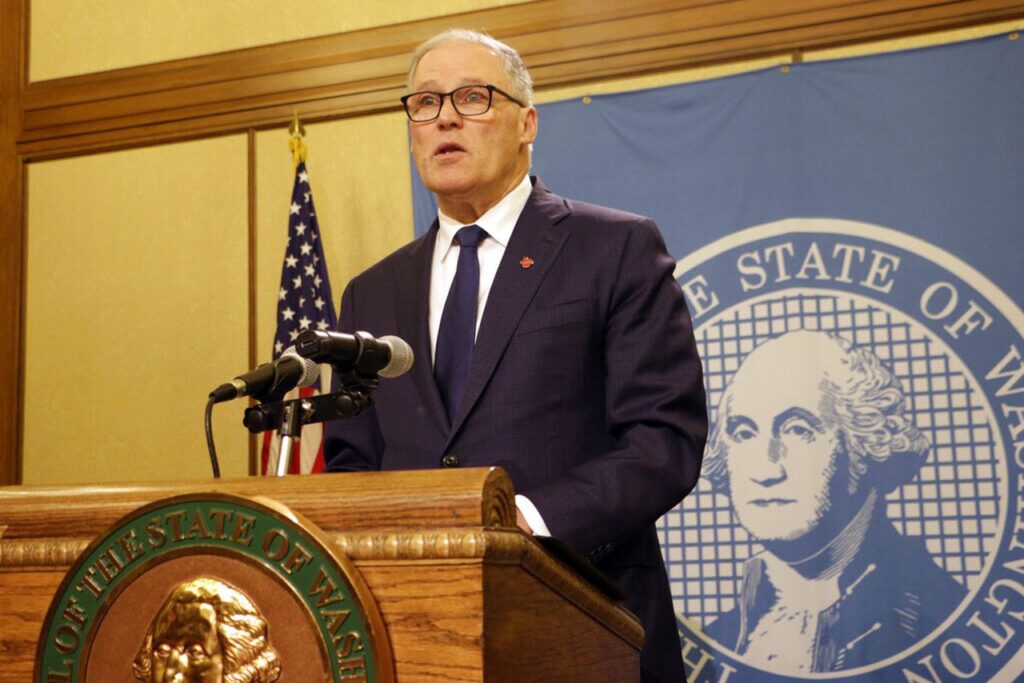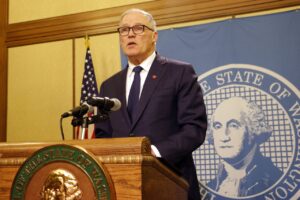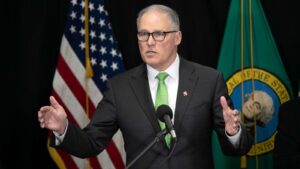Senate shoots down Republican amendments, passes emergency powers bill
3 min read
The Washington State Senate on Tuesday afternoon passed Senate Bill 5909 that puts some limits on the governor’s emergency powers but rejected two floor amendments that would have added some teeth to the legislation. SB 5909 passed on a 29-20 vote.
SB 5909 sets up a process so that legislative leaders can vote to end an emergency proclamation if it has been in place for more than 90 days when the legislature is out of session. The bill’s prime sponsor is Democratic Sen. Emily Randall.
The two amendments – one proposed by Republican Sen. Lynda Wilson and the other by Republican Sen. John Braun – would have required affirmative legislative approval after a set period of time.
Wilson’s amendment, among other provisions, would have limited to 30 days proclamations by the governor restricting certain activities unless extended by the legislature.
Braun’s amendment would have expired an order or orders issued by the governor prohibiting certain activities after 90 days if the legislature is not in session unless extended in writing by at least three of the four members of the leadership of the Senate and the House of Representatives.
Both floor amendments were voted down 27-22.
Several Republicans voted against on SB 5909, saying it didn’t go nearly far enough in terms of legislative oversight of the governor’s emergency powers.
One of those no votes was Wilson, who expressed disappointment that her and Braun’s floor amendments went nowhere.
“I was ready to vote today for a bill that would bring real balance between the legislative and the executive branches of the government during a state of emergency,” she said. “Instead, the only option before us is a half-hearted proposal that clearly keeps the balance of power tipped toward the executive branch and away from the duly elected legislators as a whole. It doesn’t ensure a thing when it comes to checks and balances.”
Democratic Sen. Andy Billig sold his yes vote on pragmatic grounds.
“Do we want to take a step forward in increasing the legislative role in emergencies?” he asked. “Do we want to take a step forward in terms of getting that balance of power exactly right? Do we want to take a step forward in having that, carrying forward the voice of our constituents in a strong way, in a stronger way, for the legislative branch compared to the executive branch? That’s the question before us. I think the answer is yes.”
Jason Mercier, director of the Center for Government Reform at the Washington Policy Center, indicated the needle hasn’t moved much in terms of emergency powers reform.
“By not requiring affirmative legislative approval to continue an emergency order, not much will change from the status quo if SB 5909 becomes law,” he said in an email to The Center Square. “This is not a complicated debate. Either Washington should join the vast majority of the country by providing meaningful legislative oversight for executive emergency powers or the Governor will continue to be empowered to make decisions behind closed doors for an indefinite period of time without the need to receive legislative signoff.”
He went on to say, “Either the legislature believes it serves an important role in debating and approving policy for the people of Washington or it is comfortable with turning the keys of the state over to one person to act behind closed doors without receiving approval by lawmakers. By not adopting either of the proposed floor amendments, SB 5909 is emergency powers reform in name only.”
Should the bill ultimately pass out of the House and land on Gov. Inslee’s desk, it remains uncertain if he would sign it. Inslee has previously indicated he is not a fan of legislation limiting his emergency powers.
“The legislature has embraced what we’re doing,” Inslee said during a Jan. 27 press conference. “We’ve been working in partnership with the legislature for two years. They have been with us, so I don’t think that it’s some big threat that it will remove the good decisions that we’ve made.”
Another emergency powers reform bill, House Bill 1772, did not receive a committee vote. HB 5909 and HB 1772 – widely considered stronger than the Senate bill – drew a combined 10,000-plus Washingtonians to sign in for public hearings on the legislation.
This article was originally posted on Senate shoots down Republican amendments, passes emergency powers bill






